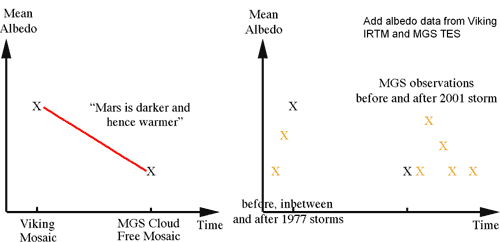 Arguments
Arguments
 Software
Software
 Resources
Comments
Resources
Comments
 The Consensus Project
The Consensus Project
 Translations
Translations
 About
Support
About
Support


Latest Posts
- Skeptical Science New Research for Week #6 2026
- The future of NCAR remains highly uncertain
- Fact brief - Can solar projects improve biodiversity?
- How the polar vortex and warm ocean intensified a major US winter storm
- 2026 SkS Weekly Climate Change & Global Warming News Roundup #05
- Help needed to get translations prepared for our website relaunch!
- Skeptical Science New Research for Week #5 2026
- Climate Variability Emerges as Both Risk and Opportunity for the Global Energy Transition
- Fact brief - Are solar projects hurting farmers and rural communities?
- Winter 2025-26 (finally) hits the U.S. with a vengeance
- 2026 SkS Weekly Climate Change & Global Warming News Roundup #04
- Skeptical Science New Research for Week #4 2026
- WMO confirms 2025 was one of warmest years on record
- Fact brief - Do solar panels release more emissions than burning fossil fuels?
- Keep it in the ground?
- 2026 SkS Weekly Climate Change & Global Warming News Roundup #03
- Skeptical Science New Research for Week #3 2026
- Climate Adam - Will 2026 Be The Hottest Year Ever Recorded?
- Fact brief - Does clearing trees for solar panels release more CO2 than the solar panels would prevent?
- Where things stand on climate change in 2026
- 2026 SkS Weekly Climate Change & Global Warming News Roundup #02
- Skeptical Science New Research for Week #2 2026
- UK renewables enjoy record year in 2025 – but gas power still rises
- Six climate stories that inspired us in 2025
- How to steer EVs towards the road of ‘mass adoption’
- 2026 SkS Weekly Climate Change & Global Warming News Roundup #01
- Skeptical Science New Research for Week #1 2026
- 2025 in review - busy in the boiler room
- Direct Air Capture
- IEA: Declining coal demand in China set to outweigh Trump’s pro-coal policies
Archived Rebuttal
This is the archived Intermediate rebuttal to the climate myth "Mars is warming". Click here to view the latest rebuttal.
What the science says...
| Martian climate is primarily driven by dust and albedo and there is little empirical evidence that Mars is showing long term warming. |
The primary empirical evidence for long term, global warming on Mars comes from Fenton 2007. Fenton compared a composite snapshot of Mars from 1977 taken by the Viking spacecraft to a 1999 image compiled by the Mars Global Surveyor (referencing work from Geissler 2005). The 1977 snapshot showed a brighter planet. In 1999, the planet had a lower albedo, with prominent darker regions in the southern mid and high latitudes. Using the albedo changes in a general circulation model, Fenton calculated a 22 year global warming trend of 0.65°C.

Figure 1: Snapshots of Mars 1977 (top) and 1999 (bottom). Image courtesy of Geissler 2005.
Fenton attributed the warming to surface dust causing a change in the planet's albedo. Martian dust plays a major role in the planet's climate (Kahn 1992). Solar variations are not the main driver of Martian climate. Nevertheless, an important question remains: is the interpretation of long term global warming on Mars correct?
A broader view of Martian climate change
To put these results in proper perspective, an understanding of what drives Martian climate is required. Global dust storms increase the surface albedo by settling brighter dust on dark surfaces. Within a year after a dust storm, various wind systems remove the dust and Mars returns to a normal, lower albedo.
The 1977 snapshot was taken after a global dust storm had deposited dust over the southern latitudes, lightening the planet surface. Before the storm, the planet had albedo comparable to recent measurements (Szwast 2006).
Fenton drew conclusions about long term climate by comparing two end points. This led to the classic error of mistaking weather for climate (similar to the recent global cooling argument). When you look at the broader data, there is no discernable long term trend in albedo:

Figure 2: Comparison of data sampling by Fenton 2007 (left, comparing 2 end points) and the full sample of data (courtesy Mark Richardson).
The apparent long-term warming between the 1970's and 1990's is largely a consequence of the timing of the two snapshots used. The "brighter" 1977 snapshot was immediately after a global dust storm when the planet was temporarily lighter. The "darker" 1999 snapshot was of the planet in it's usual state. There is little evidence that Mars is undergoing decadal-scale, long term global warming. In fact, following the 2001 global dust storm, the southern hemisphere was brighter than in 1977 (Szwast 2006).
Conclusion
The empirical evidence isn't conclusive on whether global warming is happening on Mars. However, to answer the question on whether the sun is causing Earth's global warming, there is plentiful data on solar activity and Earth's climate. Many papers have examined this data, concluding the correlation between sun and climate ended in the 70's when the modern global warming trend began.
So the argument that Martian warming disproves anthropogenic global warming fails on two points - there is little empirical evidence that Mars is warming and Mars' climate is primarily driven by dust and albedo, not solar variations.
Updated on 2010-08-20 by John Cook.
THE ESCALATOR

(free to republish)
























































